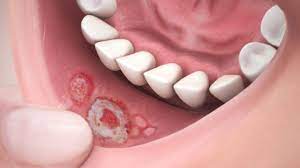Mouth Ulcer
 Small sores called mouth ulcers can develop on your lips, inner cheeks, gums, or palate (roof of mouth). Numerous things, such as minor wounds, hormone fluctuations, and emotional stress, can cause them. Although mouth ulcers aren’t contagious and usually go away on their own, there are treatments available to lessen their painful effects. Aphthous ulcers and canker sores are other names for mouth ulcers.
Small sores called mouth ulcers can develop on your lips, inner cheeks, gums, or palate (roof of mouth). Numerous things, such as minor wounds, hormone fluctuations, and emotional stress, can cause them. Although mouth ulcers aren’t contagious and usually go away on their own, there are treatments available to lessen their painful effects. Aphthous ulcers and canker sores are other names for mouth ulcers.
SYMPTOMS
- Swelling around the ulcer.
- Increased soreness when brushing your teeth.
- Pain that worsens when eating spicy, salty or sour foods.
Causes
There is no recognized etiology for mouth ulcers. However, a number of factors may have a role in the emergence of these sores.
- Minor tissue injury from dental work, such as having a cavity filled.
- Accidentally biting your cheek or tongue.
- Allergic reaction to certain bacteria.
- Wearing orthodontic braces or retainers.
- Vitamin deficiencies.
- Using harsh or abrasive toothpaste.
- Eating a lot of acidic foods, such as oranges, pineapples and strawberries.
- Hormonal changes during your period
- Lack of sleep.
- Viral, bacterial or fungal infections.
PREVENTION
While mouth ulcers cannot be completely avoided, there are steps you may take to lower your risk.
For the best oral health, brush your teeth twice a day and floss once a day.
- To prevent tissue sensitivity, use a toothbrush with soft bristles.
- Consume a balanced diet that is high in fresh fruits and vegetables.
- Schedule routine cleanings and checks with your dentist.
